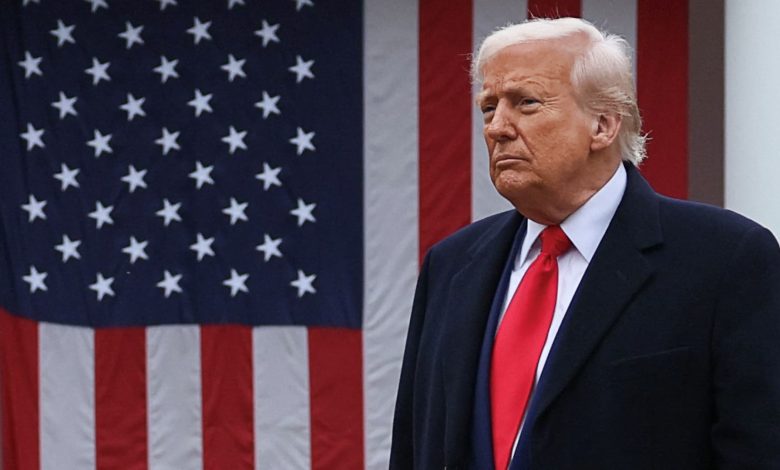Trump ‘liberation day’ tariffs: Biggest winners and losers

U.S. President Donald Trump stands, after delivering remarks on tariffs, in the Rose Garden at the White House in Washington, D.C., U.S., April 2, 2025.
Leah Millis | Reuters
Global markets, businesses and long-standing geopolitical relationships were thrown into disarray on Thursday, the day after U.S. President Donald Trump’s tariff policy — and Europe was not spared from the chaos.
The European Union has been hit with 20% duties, while the U.K. was hit with a lower 10%, benefiting from its more balanced U.S. trade relationship. All eyes will now be on how far policymakers will go in their response, and how deeply the conflict can escalate.
Most analysts agree that, from an economic perspective, there are few — or perhaps no — economic winners from the expected slowdown in growth and the fracturing of trade ties.
Some bright spots nevertheless emerged among European assets on Thursday — as well as some deeply negative ones.
Luxury goods
Europe’s Stoxx Luxury 10 index was 4.2% lower by 12:45 p.m. in London on Thursday. Burberry shares were more than 6% lower, while LVMH shed 4.2% and Gucci owner Kering was 4% lower.
Luxury products are directly in the firing line of Trump’s reciprocal tariffs, as they are frequently manufactured in Europe and exported Stateside.
In a note on Thursday, analysts at Citi said German footwear maker Birkenstock, Italian fashion brand Brunello Cucinelli and Danish jeweller Pandora were among the sector names with the biggest revenue exposures to America, with the U.S. accounting for 31% to 47% of the companies’ sales.
Luxury conglomerate LVMH, Gucci owner Kering and Cartier parent Richemont also all generated at least 20% of sales in the U.S., Citi also noted.
Food and drink manufacturers
The EU describes the U.S. as a “major destination” for food and beverage products, such as wine, beer, spirits, chocolate, cheese and olive oil.
AB InBev, the world’s largest brewer, saw its shares drop 0.6% on Thursday, while Pernod Ricard and Heineken were 1% and 0.7% lower, respectively. Tate & Lyle, which operates one of the world’s biggest sugar refineries, shed 0.6%.
“Our sectors are highly integrated across the Atlantic and our shared trade in spirits supports many jobs on both sides, across manufacturing, distribution, farming, retail and hospitality,” trade body Spirits Europe said in a statement on Thursday. “We want to ensure a return to an environment that supports continued growth for both EU and US producers.”
Germany
Germany was the EU’s largest exporter of goods to the U.S last year. The European country is home to some of the region’s biggest carmakers, including BMW, Volkswagen, Mercedes-Benz and Porsche — all of which are now subject to 25% import tariffs.
In a note to clients on Thursday, Robin Winkler, chief economist at Deutsche Bank Research, said there was “no question that last night’s tariff announcement … is bad news for the German economy.”
“The negative surprise however lies not so much in the direct tariff hit,” he said, noting that markets had been expecting the reciprocal 20% tariff.
“However, the much higher US levies of 50% or more on Asian imports are a genuine surprise and imply a sharper global trade shock than we and most observers had expected,” Winkler said. “Indirectly, this is a negative shock for Germany, too.”
Germany’s Federal Association of Wholesalers, Foreign Trade and Services (BGA) slammed Trump’s reciprocal tariffs as “a frontal attack on world trade” in a statement on Thursday.
“With drastic tariff hikes for more than 100 trading partners, the American president is plunging the world into an open trade war with an American Brexit,” BGA President Dirk Jandura said in an emailed statement. “I assume that the conflict will significantly affect our economic growth. The longer it takes, the more painful it will be for everyone, including the USA.”
Retail
A host of retailers, selling clothes, shoes, household goods, electronics and beyond, have global supply chains based in Asia. South and Southeast Asian countries including Cambodia, Vietnam, Indonesia, Bangladesh and Sri Lanka are packed with factories which produce garments and products for companies such as H&M and Adidas — and were controversially hit with some of the highest rates among the recently announced U.S. reciprocal tariffs, many upward of 40%.
“For many exporters [new tariffs are] the difference between a profit and a loss. Businesses need to take a long hard look at whether they can continue to serve U.S. customers profitably – and if they can’t, they need to concentrate focus on new, more friendly markets, perhaps where trade deals already exist, and if necessary, diversify manufacturing into other products,” Ian Worth, Director of VAT and Customs Duty at consultancy Crowe, said in emailed comments.
“The move to charge tariffs at the time of export – as opposed to on arrival to the U.S. – has the potential to cause a number of issues,” Worth added.
Shipping
Logistics and shipping firms tied to the health of the global economy will feel the impact amid widespread forecasts of a drag on economic growth and trade.
Danish shipping giant Maersk on Thursday said that the tariff plan announced by the White House would lead to more caution among its customers in a more fragile economic environment.
“In its current form, [tariffs] clearly isn’t good news for global economy, stability and trade,” the company said in a statement.
Shares of European shipping and logistics firms were broadly lower on Thursday, with Maersk down 12%, Hapag-Lloyd falling 8.3%, and DSV shedding 8.2%.
Banks
Banks were one of Europe’s worst-performing sectors Thursday, with the regional Stoxx Banking index plunging 4.52% — on course for its sharpest sell-off in two years.
This sector is also sensitive to a slowdown in global growth and fears of potential recessions or a wide-ranging trade war.
British bank Standard Chartered, which has high exposure to Asia, dropped 10%. Global juggernaut HSBC was nearly 7% lower.
Autos
Trump’s 25% tariffs on foreign auto imports came into effect on Thursday, prompting many of the world’s largest car companies to extend recent losses.
Germany’s Volkswagen, Mercedes-Benz Group and BMW were all trading around 2% lower at 1:15 p.m. London time (8:15 a.m. ET), while Milan-listed Stellantis — which owns household names including Jeep, Dodge, Fiat, Chrysler and Peugeot — fell 1.8%. Shares of Sweden’s Volvo Cars tumbled more than 11%.Stateside, Ford and General Motors were both around 2% lower in premarket trade.
An escalating global trade war is expected to have a profound impact on the car industry, particularly given the high globalization of supply chains and the heavy reliance on manufacturing operations across North America, particularly Mexico.
Regional currencies
European currencies were one of the few asset classes in the region to rally on Thursday. The euro and the British pound touched on six-month highs, while the Swiss franc rose to its highest level against the greenback in since the middle of October.
Prior to Trump’s so-called liberation day tariffs announcement, market watchers told CNBC the euro and sterling could see upside, as new U.S. import duties came into force.
In a note on Thursday morning, Jordan Rochester, head of FICC strategy at Mizuho EMEA, said he saw the euro jumping as high as $1.12 in the near term. By 12:32 p.m. in London on Thursday, it had gained 2% to trade at $1.107.
“Net-net FX is chasing the real yield equilibrium which suggests EUR/USD to 1.11 or indeed 1.12. Our year end forecast but at this pace it’s coming by next week,” Rochester said in Thursday’s note.
However, he added that there was “a limit to the USD selloff at some point,” predicting that the euro could start to sell off if it crossed the $1.11 threshold by Friday.
Pharmaceuticals
Utilities
Europe’s utility stocks led gains on Thursday, defying a broader market sell-off as investors reacted to Trump’s sweeping tariffs.
Utilities stocks, which are traditionally a defensive play in times of market turmoil, were last seen 2.6% higher during afternoon deals. France-based Engie and Spain’s Iberdrola were among the sector’s top performers, both up around 2.7%, with the latter notching a fresh 52-week high.



